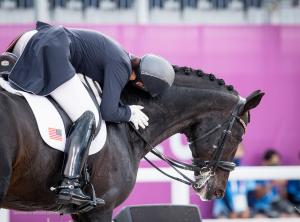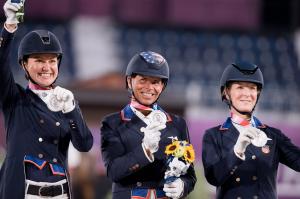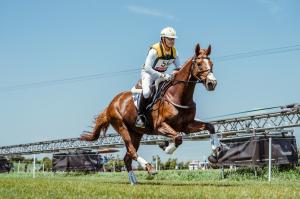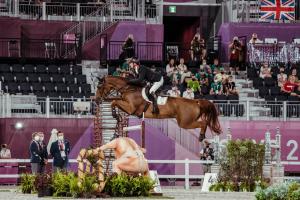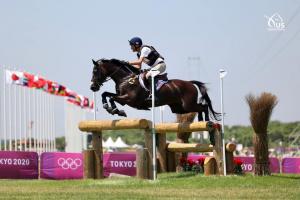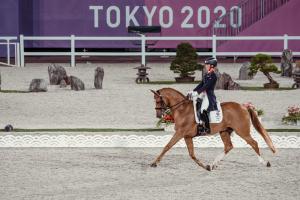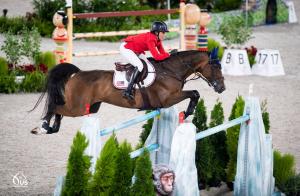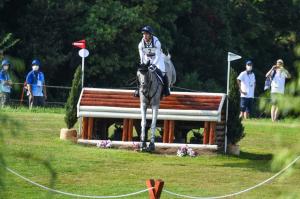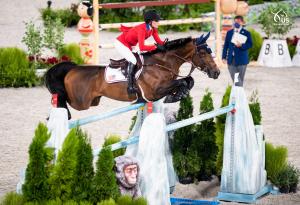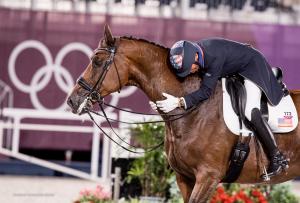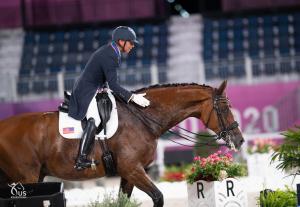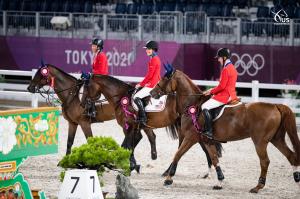By Melanie Taylor, with Introduction by Nancy Brannon
Veteran show jumping Olympic gold medalist Melanie Smith Taylor, of Germantown, Tenn., provided commentary for NBC’s coverage of the equestrian events Dressage and Show Jumping for the 2020 Tokyo Olympics. She has an established relationship with NBC Sports as equestrian analyst at Olympic assignments, stemming from the 1988 Games in Seoul. Melanie’s informative comments and descriptions of the action greatly enhanced TV viewers’ understanding of these events. Here’s Melanie’s experience:
I was in Stamford, Connecticut at the NBC studios watching on a TV screen just like the rest of the world. Many of the sports nowadays are covered from studios, now with the emergence of livestream. Although it is obviously much more fun and exciting to be at the Olympic venue, I worked with a wonderful team experienced in covering horse events. My co-announcer Randy Moss and producer Amy Zimmerman normally cover the Triple Crown races instead of the three Olympic disciplines of Dressage, Eventing, and Show Jumping.
A lot of research had to be done on the hundreds of competitors as we called each event “live to tape,” but we never knew who or how many would make the daily TV show. Because of the 11-hour time difference, we would arrive at our studios by 3 a.m. most days and not leave until 10 a.m. Getting used to the graveyard shift was the most difficult part.
Qualifying Rules for individual and team Dressage and Show Jumping events were different this year, so no one knew exactly how things would turn out. In the end, it was great sport and the top horse/rider combinations won out in the end.
Some first time Olympians and many veterans were all under the same pressure to perform their best.
The German Dressage Team won Gold and the United States fought hard for their Silver medals, while Great Britain took Bronze. The American Team was comprised of Adrienne Lyle on Salvino, Steffen Peters on Suppenkasper and Sabine Schut-Kery on Sanceo.
The Individual Gold and Silver medals went to Germany’s first timer Jessica von Bredow-Werndl riding TSF Dalera and veteran Isabell Werth riding Bella Rose 2, respectively, who, with her Silver medal, became the most decorated equestrian of all time. The Bronze medal went to Charlotte Dujardin of Great Britain riding Gio.
Eventing came to an exciting conclusion and broke records as well.
A British team full of Olympic debutants won Gold by a country mile for the first time since 1972. The intrepid Aussies climbed from sixth after the first phase to Silver, despite a last-minute horse-and-rider substitution. Rio’s Gold medalists, the French team, climbed from ninth to Bronze, despite having to replace two horses and largely riding inexperienced horses. The US team finished sixth.
Germany’s Julia Krajewski, on Amande de B’Neville, became the first woman to win Individual Gold. Women have only been allowed to compete in Eventing since the 1964 Olympics. Tom McEwen of Great Britain took Silver with his lovely bay gelding Toledo De Kerser. Andrew Hoy, in his eighth Olympics representing Australia, was the only rider to finish on his Dressage score and captured Bronze on Vassily De Lassos. Hoy at 62 is also the oldest equestrian to win an Olympic medal.
The Show Jumping events were fantastic even though there was much controversy over the new format, which included many changes. The Individual Show Jumping came before the Team Competition; faults were not carried over from the qualifying rounds; and there was no drop score in the Team competition, which has been traditional at previous Olympics.
The outright stars of Show jumping at the Olympics were the Swedes. All three riders jumped off for Individual Medals and also jumped off for the Team medals. The Individual competition came down to a six-way tie for Gold. No one could beat Ben Maher and his fabulous horse Explosion W, but Peder Fredricson and All In gave it their all to take Silver. Maikel van der Vleuten on Beauville Z took the Bronze, while Swedish riders were 4th and 5th and Japan slotted into 6th.
The Team Show Jumping competition on the final day was spectacular! Santiago Varela from Spain was the course designer and he did a magnificent job. The United States and Sweden jumped off for Gold in a repeat of the World Equestrian Games in 2018 and the Athens Olympics in 2004. The Bronze had already been decided for Belgium. This time Sweden would not be denied as they had been both times before. All six riders, three from each team, were clear in the jump off and the cumulative times decided the medals by just a little over 1 second. It was an incredible display of horsemanship right down to the last jump and the very last second! U.S. Team members were: Laura Kraut on Baloutinue; Jessica Springsteen on Don Juan; and McLain Ward on Contagious. Swedish riders were Henrik Von Eckermann on King Edward; Malin Baryard-Johnsson on Indiana; and Peder Fredricson on All In.
A side note: Two Swedish team horses, All In and King Edward, competed barefoot without shoes.
Veteran show jumping Olympic gold medalist Melanie Smith Taylor, of Germantown, Tenn., provided commentary for NBC’s coverage of the equestrian events Dressage and Show Jumping for the 2020 Tokyo Olympics. She has an established relationship with NBC Sports as equestrian analyst at Olympic assignments, stemming from the 1988 Games in Seoul. Melanie’s informative comments and descriptions of the action greatly enhanced TV viewers’ understanding of these events. Here’s Melanie’s experience:
I was in Stamford, Connecticut at the NBC studios watching on a TV screen just like the rest of the world. Many of the sports nowadays are covered from studios, now with the emergence of livestream. Although it is obviously much more fun and exciting to be at the Olympic venue, I worked with a wonderful team experienced in covering horse events. My co-announcer Randy Moss and producer Amy Zimmerman normally cover the Triple Crown races instead of the three Olympic disciplines of Dressage, Eventing, and Show Jumping.
A lot of research had to be done on the hundreds of competitors as we called each event “live to tape,” but we never knew who or how many would make the daily TV show. Because of the 11-hour time difference, we would arrive at our studios by 3 a.m. most days and not leave until 10 a.m. Getting used to the graveyard shift was the most difficult part.
Qualifying Rules for individual and team Dressage and Show Jumping events were different this year, so no one knew exactly how things would turn out. In the end, it was great sport and the top horse/rider combinations won out in the end.
Some first time Olympians and many veterans were all under the same pressure to perform their best.
The German Dressage Team won Gold and the United States fought hard for their Silver medals, while Great Britain took Bronze. The American Team was comprised of Adrienne Lyle on Salvino, Steffen Peters on Suppenkasper and Sabine Schut-Kery on Sanceo.
The Individual Gold and Silver medals went to Germany’s first timer Jessica von Bredow-Werndl riding TSF Dalera and veteran Isabell Werth riding Bella Rose 2, respectively, who, with her Silver medal, became the most decorated equestrian of all time. The Bronze medal went to Charlotte Dujardin of Great Britain riding Gio.
Eventing came to an exciting conclusion and broke records as well.
A British team full of Olympic debutants won Gold by a country mile for the first time since 1972. The intrepid Aussies climbed from sixth after the first phase to Silver, despite a last-minute horse-and-rider substitution. Rio’s Gold medalists, the French team, climbed from ninth to Bronze, despite having to replace two horses and largely riding inexperienced horses. The US team finished sixth.
Germany’s Julia Krajewski, on Amande de B’Neville, became the first woman to win Individual Gold. Women have only been allowed to compete in Eventing since the 1964 Olympics. Tom McEwen of Great Britain took Silver with his lovely bay gelding Toledo De Kerser. Andrew Hoy, in his eighth Olympics representing Australia, was the only rider to finish on his Dressage score and captured Bronze on Vassily De Lassos. Hoy at 62 is also the oldest equestrian to win an Olympic medal.
The Show Jumping events were fantastic even though there was much controversy over the new format, which included many changes. The Individual Show Jumping came before the Team Competition; faults were not carried over from the qualifying rounds; and there was no drop score in the Team competition, which has been traditional at previous Olympics.
The outright stars of Show jumping at the Olympics were the Swedes. All three riders jumped off for Individual Medals and also jumped off for the Team medals. The Individual competition came down to a six-way tie for Gold. No one could beat Ben Maher and his fabulous horse Explosion W, but Peder Fredricson and All In gave it their all to take Silver. Maikel van der Vleuten on Beauville Z took the Bronze, while Swedish riders were 4th and 5th and Japan slotted into 6th.
The Team Show Jumping competition on the final day was spectacular! Santiago Varela from Spain was the course designer and he did a magnificent job. The United States and Sweden jumped off for Gold in a repeat of the World Equestrian Games in 2018 and the Athens Olympics in 2004. The Bronze had already been decided for Belgium. This time Sweden would not be denied as they had been both times before. All six riders, three from each team, were clear in the jump off and the cumulative times decided the medals by just a little over 1 second. It was an incredible display of horsemanship right down to the last jump and the very last second! U.S. Team members were: Laura Kraut on Baloutinue; Jessica Springsteen on Don Juan; and McLain Ward on Contagious. Swedish riders were Henrik Von Eckermann on King Edward; Malin Baryard-Johnsson on Indiana; and Peder Fredricson on All In.
A side note: Two Swedish team horses, All In and King Edward, competed barefoot without shoes.
